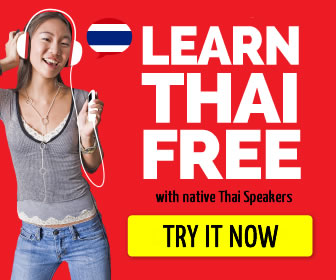How to Say "Thank you" in Thai
You can click or tap the play buttons below to listen to the correct pronunciation of "Thank you" in Thai. On this page we teach you several ways to say "thank you" in Thai depending on the situation. We will discuss the polite ways and even some of the cheeky ways to use this phrase.
Although most Thai people understand the English phrase "Thank you", when you say thank you to a Thai person in their native Thai language they might appreciate the fact that you have made an effort to learn just one important Thai phrase.
The Thais pride themselves on being polite people and for you to speak a polite Thai phrase might gain you a bit of respect.
"Thank you" in Thai can also be spoken with just two words. KOB KHUN (KOB = Thank; KHUN = you)
The Thais usually use the three word polite version "KOB KHUN KHRAP".
The last word "KHRAP" (ครับ) is a polite word that colors or softens the phrase and could be translated as meaning "sir". But this word is spoken only by males.
If a female person is speaking then the polite word at the end of the phrase becomes "KA" (ค่ะ) .
Download a Bundle of Thai Phrases with Audio and Video.- When Jane says "thank you" she says: KOB KHUN KA
- When John says "thank you" he says: KOB KHUN KHRAP
The above two examples are the polite ways to say "thank you" in Thai. You could just say KOB KHUN amongst friends but it will always be socially safer and a no brainer to use the polite version. How you say "thank you" will depend on your relationship to the person you are thanking. For example if you are thanking your boss or any higher ranking person use one of the polite words KHRAP or KA, depending on your gender, at the end of the phrase.
- Notice the word GAHN in the above two examples?
- What does GAHN mean?
Other ways to say "Thank you" in Thai
As mentioned above you can just use the two words "KOB KHUN" when speaking with friends.
You can also use the less formal version, "KOB JAI", which definitely should only be used with friends or people of lower status.
This version is sometimes softened by placing NAA at the end of the phrase.
When in Thailand you might hear some of the women street vendors using another version of the informal way to say "thank you" when they say the three words "KOB JAI JAA". The word "JAA" is another polite softener placed at the end of the phrase and spoken by females.
MEUNG (มึง) “You”. In Thailand you will often hear Thai people use this word when speaking to intimate friends. This is not a word that a foreigner should use unless deeply immersed in the Thai way of life and culture.
MEUNG is sometimes softened by placing the word NA (นะ) before it. NA MEUNG.
Have fun with Thai language
More often than not Thais will use the direct transliteration of "Thank you" THANG KEW (แต้งกิ้ว) when speaking with foreigners.
Here is something that will certainly create a few laughs.
If you change the pronunciation a little and say:
TANG KEW
(แทงคิ้ว) then you will have "pierced eyebrows". Sorry your eyebrows are not going to become magically pierced but that's what you will be saying. Try pointing your finger at your eyebrows as you say "TANG KEW".
Site Navigation
- Home
- King Rama IX Coins
- Learn Thai From Thai People
- The Benefits of Speaking Thai
- ThaiPod Language Course
- Speak Thai With Bar Girls
- What Time Is It?
- Thai Pronouns
- Best Way to Learn Thai
- Thai Days Of The Week
- Thai Months Of The Year
- Thai Phrases in The Hotel Room
- Thai on Important Documents
- Questions Who What How Where
- Street Names Pattaya Darkside
- Express Feelings in Thai
- Thai Love Words and Phrases
- Building and materials
- Dangue Hospitals Health
- Cars and Motorbikes
- How to say "Thank you"
- Bank Documents



